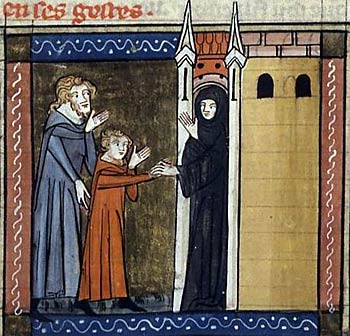Rev. Molly F. James, PhD
DFMS Noonday Prayer
December 21, 2021
Psalm 126; Habakkuk 2:1-4; John 20:24-29
May God’s Word be spoken. May God’s Word be heard. May that point us to the living Word who is Jesus Christ our Lord. Amen.
Ah, St. Thomas. He feels like an old friend. I would guess the same true is for many clergy across the Church. Somehow in its wisdom, the Lectionary Committee decided that it would be appropriate for this story of “Doubting Thomas” to be the Gospel for the Sunday after Easter, every year. So those of us who spent years as an assistant or an associate or serving a small parish where there are no other clergy have a personal library of sermons on this text. They pair nicely with our sermons on the prologue of the Gospel of John which is the Gospel for every year for the Sunday after Christmas.
While I have certainly had my moments of feeling frustrated by the repetition in our lectionary, those moments where I want to say, “Thomas? Again? Really? How am I supposed to come up with something new to say about him?” But of course if I pause and breathe and sit with it, and I feel differently. I think about my time in Exeter in the UK when I got to sit in the Cathedral for evensong day after day. And you know what is true about that service, the Magnifcat is sung. Pretty much daily. We only get Thomas twice a year: 1 Easter and his feast day. We get the Magnificat everyday. Why? Because the Magnificat is always a good idea. It is, indeed, a text, a message we need to have be central to our lives, to the daily practice of our faith. It is a message that speaks powerfully into whatever kind of day we are having.
And I believe that the same is true of Thomas. His story speaks powerfully to us again and again. I think it especially speaks to us in this present time. How often, in recent days especially, have we felt like Thomas? Which story, which news headline, which study, which infographic or chart are we supposed to believe? How do we trust information when it seems to be changing on a daily or hourly basis? Do we need to change our plans for the holidays? What is the best way forward for us in our particular circumstances?
The uncertainty and anxiety are swirling all around us. Again. And we are exhausted. We are disheartened and frustrated. If we wanted to find reasons to doubt, reasons to fear, reasons to give into that same sense of foreboding and disillusionment that tempted Thomas. It would be easy to join him, “See, everything is terrible. They have killed my Lord. And to make matters worse someone stole his body, The world is out to get us. Nothing we hoped for is going to come true. All our dreams have been dashed.” Thomas requires actual proof, an actual incarnational experience to believe that his fears are not true. To believe that the tomb is empty because resurrection is real. Because God’s love is stronger than everything, even death.
And we cannot blame him. The fundamental truths of our lives are not ones that we know just because we hear them or read them. Think about how we talk about them. We talk about knowing them “in our bones.” The most important truths of our lives are not merely intellectual. They are not just information. They are experiential. They are incarnational.
That’s why we can still feel disquieted after we read the news headlines or the latest CDC briefing or the latest study on any of the myriad challenges our society is currently facing. Even if it is good news, it is just information. We need to be reminded of the fundamental truths of our lives and our faith, and that doesn’t happen through information. It happens through experience.
So my friends, in these days, when you find yourselves joining Thomas in fear and doubt, reconnect to the experience of faith. Light a candle. Pray with an icon. Walk in the splendor of creation. Call that friend whose voice is a balm to your weary spirit. Hug your loved ones more often. Listen to the music that restores your soul. Attune your senses to all the signs of light and hope in our world. In gathered community. In more hours of daylight. In smiles and small acts of kindness. In the gift of quiet moments. In laughter. In meals shared, even on Zoom. The affirmations of God’s love. Of hope and possibility are all around us. We just need to be listening with our hearts as well as our ears. AMEN.






